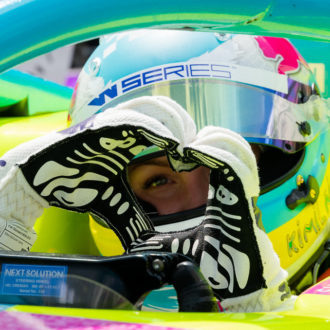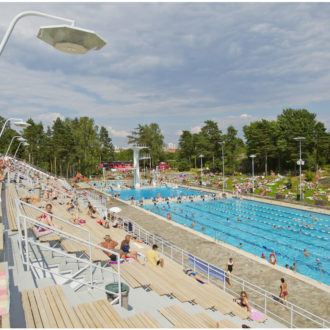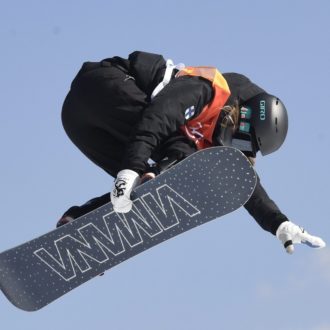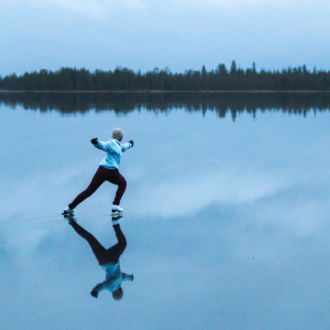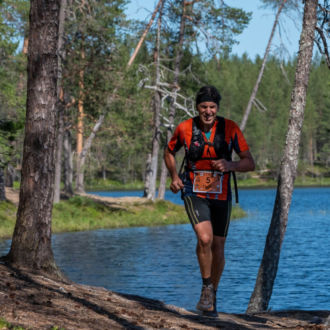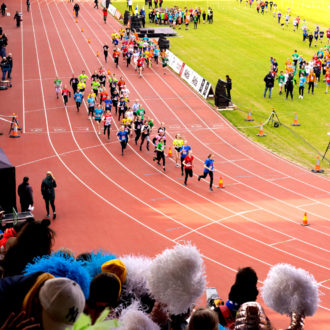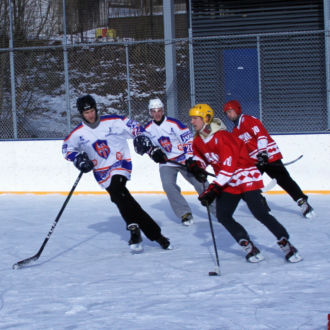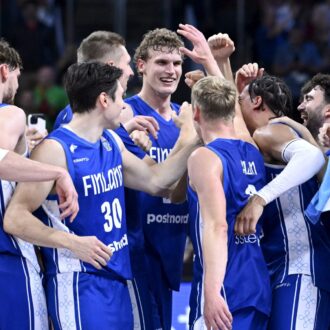Brilliant role models and a fascination with technology have made Finland a front-runner in motorsports.
In 2022, Kalle Rovanperä of Finland became the youngest-ever World Rally Champion, at the age of 22. He was the first Finn to win the title since Marcus Grönholm in 2002, but Rovanperä (whose father, Harri, also had a successful rally career) joined a long line of Finnish athletes who have ascended the winners’ podium in motorsports championships.
Let’s take a look at a few famous Finnish drivers over the years and some of the factors that led to their success. (See also: Finnish racecar drivers excel at acceleration.)
“Finn” rhymes with “win”
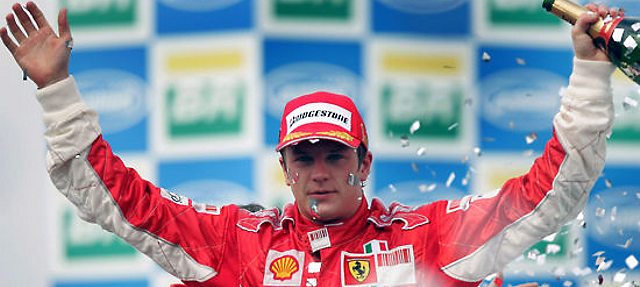
Kimi Räikkönen clinched the 2007 Formula One World Championship by winning the last race of the season, the Brazilian Grand Prix in Sao Paulo.Photo: Lehtikuva
Back in 2007, the way Kimi Räikkönen won the Formula One world championship came as a surprise to many. But the fact that Räikkönen became champion after several years of trying probably did not surprise anyone who follows the sport.
Räikkönen’s exceptional talents became known as early as 2001 when he debuted in F1 after skipping over two formula racing series that drivers normally compete in before advancing to the pinnacle of car racing.
There may have been more confidence in Räikkönen because he’s a Finn. Over the decades, Finnish drivers had snapped up Formula One and World Rally Championship titles, as well as winning championships in Grand Prix motorcycle racing, Motocross, Trial, Enduro, Ice Speedway and Snowcross.
For years, the directors of rally teams have known the sure-fire recipe for success: “If you want to win, you need a Finn.”
Reasons behind the success
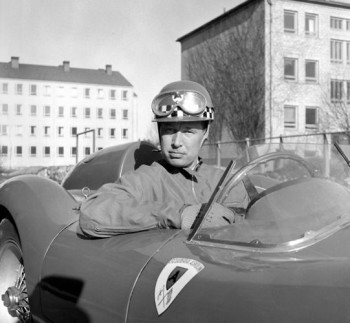
In the 1950s, Curt Lincoln (1918–2005) was Finland’s leading racing driver and is regarded as the forefather of the present champions. The photo was taken at the Eläintarha street race in Helsinki, which he won a total of 14 times.Photo: Lehtikuva
Relative to its population, Finland has been the number one country in the world in motorsports, measured by international success.
But what is it that makes Finns so successful?
Kari O. Sohlberg, formerly chairman of AKK Motorsport and board member of FIA (International Automobile Association), has said that he believes car racing became ingrained in the Finnish psyche back in the days of the Eläintarha Race, which was held in Helsinki from 1932 to 1963.
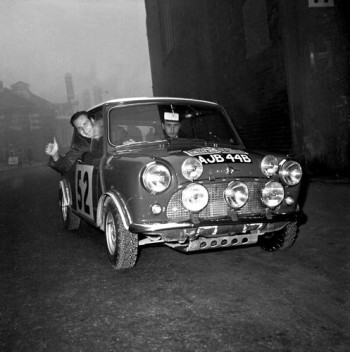
Timo Mäkinen, (1938–2017), was one of the greats of rally driving. The picture is from the Monte Carlo rally of 1965, which Mäkinen won in a Mini Cooper.Photo: Lehtikuva
“After that, we got a few role models,” says Sohlberg “Rauno Aaltonen and Timo Mäkinen were successful in rally racing back in the 1960s, while in Formula One Keke Rosberg blazed the trail by winning the title in 1982.”
The success stories have a varied background in different motorsports. Rally drivers have sped over backcountry dirt roads in Finland since their teenage years, while Finnish F1 drivers have started their racing careers in the karting series.
Professor Matti Urrila, who specialises in the psychological coaching of athletes, believes that Rosberg gave Finland an important cultural legacy.
“At first, people made fun of him but, in the end, he proved that anything is possible,” says Urrila, who also cooperated with drivers such as Mika Häkkinen in Formula One and Marcus Grönholm in rally. “The victory boosted the confidence of our increasingly motorising nation. No one’s chances were doubted anymore.”
Finnish know-how
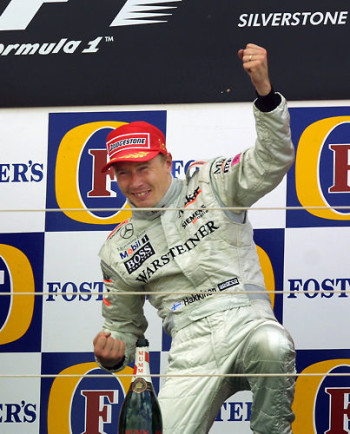
Mika Häkkinen celebrates on the podium after winning the 2001 British Grand Prix at Silverstone in 2001.Photo: Lehtikuva
Matti Urrila stresses that in rally and Formula One circles, personal connections are also important.
“As a result of our drivers’ success, Finland has an abundance of expertise in how to become a world champion in Formula One,” he says. “Beginning with sponsorship and connections, there is a very realistic understanding of what it takes. And that puts Finland in quite a unique situation.”
For example, in Formula One, Keke Rosberg managed Mika Häkkinen and Jyrki Järvilehto (J. J. Lehto), while in rally racing, businessman Timo Jouhki worked as the manager for Juha Kankkunen, Tommi Mäkinen and Mikko Hirvonen.
Special character
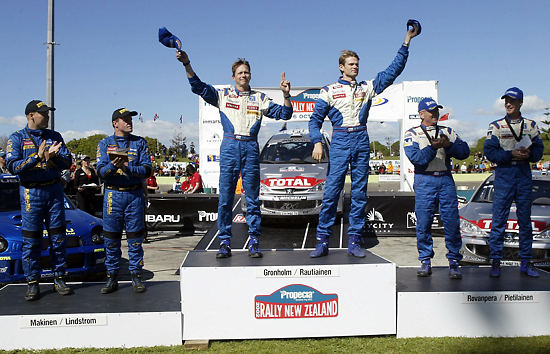
Finnish drivers swept the top three places at the Rally of New Zealand in October 2002. At centre-left is winner and World Champion Marcus Grönholm with co-driver Timo Rautiainen. On their left are Harri Rovanperä and co-driver Risto Pietiläinen, and on their right third-placed Tommi Mäkinen with co-driver Kaj Lindström.Photo: Lehtikuva
All of this would not be possible without what some might call the special character of the Finnish nation.
“Finns are fascinated by technology, by the collaboration of man and machine,” Urrila says. “War reparations that had to be paid to the Soviet Union after the Second World War could not have been fulfilled with agriculture alone, so we started developing our engineering industry. As a result, our society became mechanised.”
It is hardly a coincidence that Kimi Räikkönen studied car repair at a vocational college, Mika Häkkinen studied plating and welding and Mika Salo was an electrical fitter. The job of a mechanic was also familiar to drivers such as Juha Kankkunen, Tommi Mäkinen and Marcus Grönholm, who wrestled with tractors while working as farmers in their spare time.
But the final truth about Finland’s success may be summed up by this:
“Finns are crazy,” as world rally champion Sébastian Loeb said one summer at a rally competition in Jyväskylä, Finland after losing to Marcus Grönholm.
By Pekka Anttila, November 2007, last updated August 2023; a version of this article originally appeared in the magazine Suomen Kuvalehti.
Finnish World Champions
Table updated in August 2023. |
||||||||||||||||||||||||||||||||||||||||||||||||||||||||||||||||||||||||||||
